Analyzing Conflict: Communication & Negotiation in Darwin Plant
VerifiedAdded on 2023/06/04
|5
|1742
|346
Case Study
AI Summary
This case study examines the managerial challenges faced by Mr. Johnson, the new plant manager at Darwin, focusing on conflict resolution, effective communication, and power dynamics. It addresses issues such as lack of motivation, employee attitudes, and the impact of power on management. The solution incorporates motivational theories, emotional intelligence, and organizational behavior principles. Mr. Johnson is advised to foster teamwork, innovation, and continuous learning, while also developing strong problem-solving and conflict management skills. Effective leadership, empowerment, and timely feedback are highlighted as crucial for achieving organizational goals. The analysis draws from various management theories and research to provide practical guidelines for Mr. Johnson in navigating his new role and fostering a productive work environment. Desklib is a great platform to find such solved assignments.
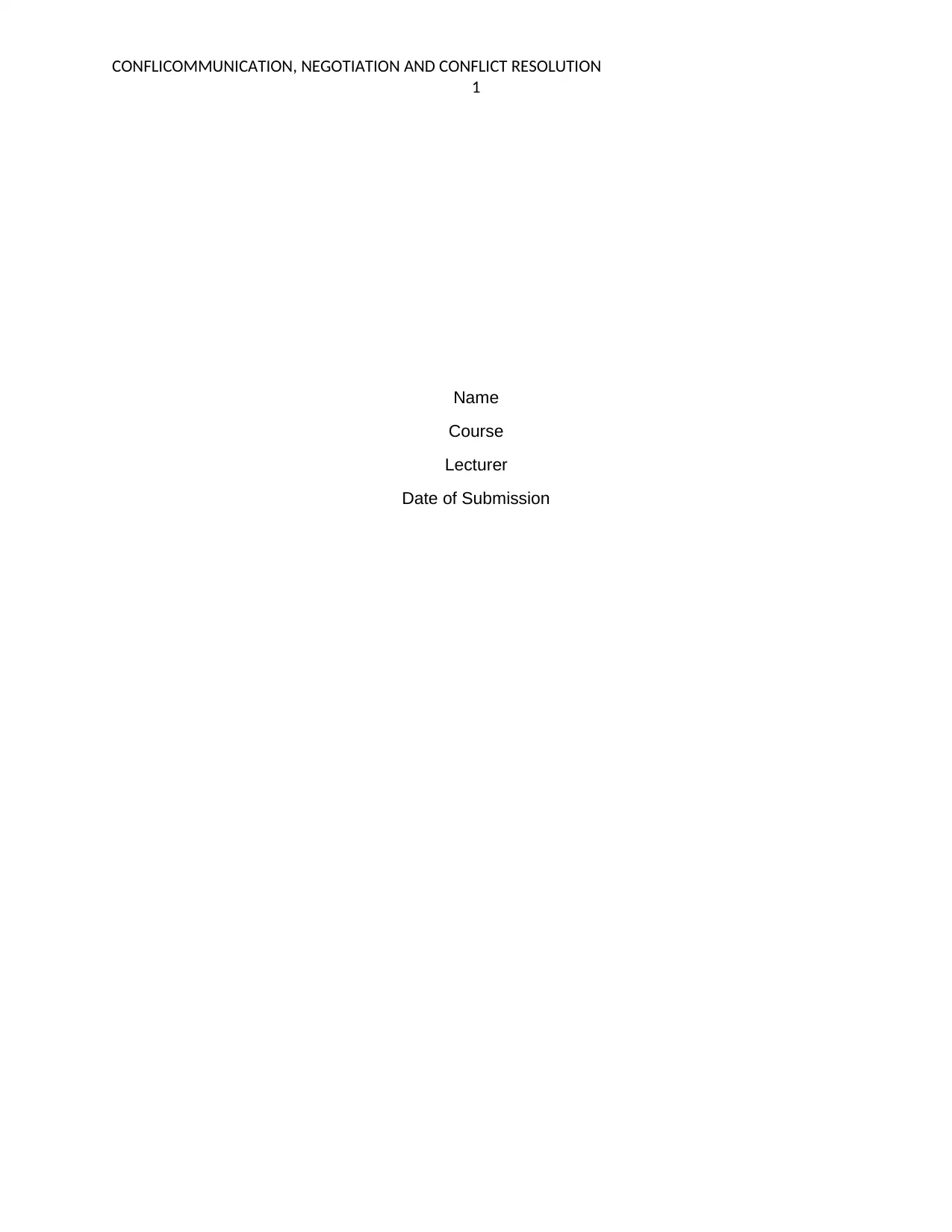
CONFLICOMMUNICATION, NEGOTIATION AND CONFLICT RESOLUTION
1
Name
Course
Lecturer
Date of Submission
1
Name
Course
Lecturer
Date of Submission
Paraphrase This Document
Need a fresh take? Get an instant paraphrase of this document with our AI Paraphraser
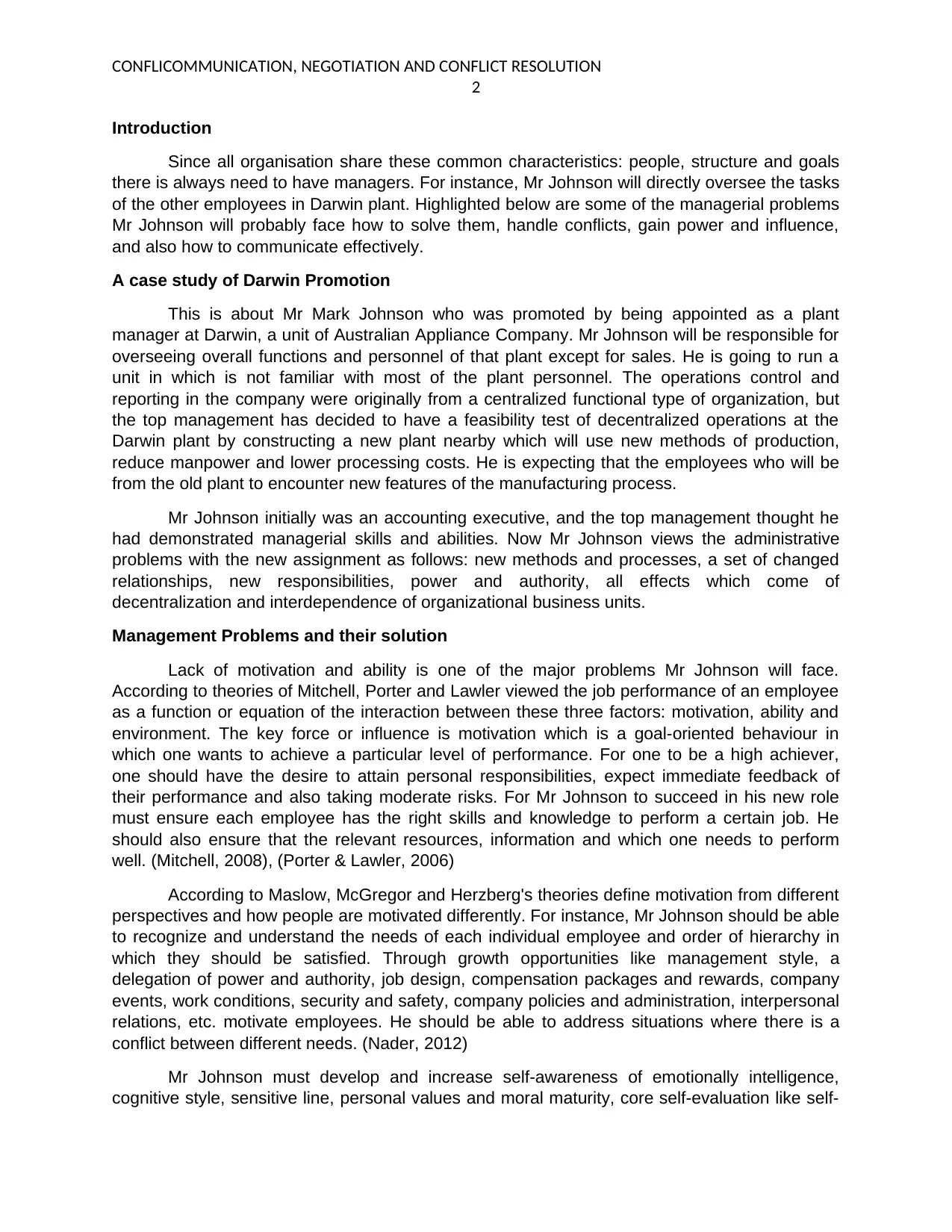
CONFLICOMMUNICATION, NEGOTIATION AND CONFLICT RESOLUTION
2
Introduction
Since all organisation share these common characteristics: people, structure and goals
there is always need to have managers. For instance, Mr Johnson will directly oversee the tasks
of the other employees in Darwin plant. Highlighted below are some of the managerial problems
Mr Johnson will probably face how to solve them, handle conflicts, gain power and influence,
and also how to communicate effectively.
A case study of Darwin Promotion
This is about Mr Mark Johnson who was promoted by being appointed as a plant
manager at Darwin, a unit of Australian Appliance Company. Mr Johnson will be responsible for
overseeing overall functions and personnel of that plant except for sales. He is going to run a
unit in which is not familiar with most of the plant personnel. The operations control and
reporting in the company were originally from a centralized functional type of organization, but
the top management has decided to have a feasibility test of decentralized operations at the
Darwin plant by constructing a new plant nearby which will use new methods of production,
reduce manpower and lower processing costs. He is expecting that the employees who will be
from the old plant to encounter new features of the manufacturing process.
Mr Johnson initially was an accounting executive, and the top management thought he
had demonstrated managerial skills and abilities. Now Mr Johnson views the administrative
problems with the new assignment as follows: new methods and processes, a set of changed
relationships, new responsibilities, power and authority, all effects which come of
decentralization and interdependence of organizational business units.
Management Problems and their solution
Lack of motivation and ability is one of the major problems Mr Johnson will face.
According to theories of Mitchell, Porter and Lawler viewed the job performance of an employee
as a function or equation of the interaction between these three factors: motivation, ability and
environment. The key force or influence is motivation which is a goal-oriented behaviour in
which one wants to achieve a particular level of performance. For one to be a high achiever,
one should have the desire to attain personal responsibilities, expect immediate feedback of
their performance and also taking moderate risks. For Mr Johnson to succeed in his new role
must ensure each employee has the right skills and knowledge to perform a certain job. He
should also ensure that the relevant resources, information and which one needs to perform
well. (Mitchell, 2008), (Porter & Lawler, 2006)
According to Maslow, McGregor and Herzberg's theories define motivation from different
perspectives and how people are motivated differently. For instance, Mr Johnson should be able
to recognize and understand the needs of each individual employee and order of hierarchy in
which they should be satisfied. Through growth opportunities like management style, a
delegation of power and authority, job design, compensation packages and rewards, company
events, work conditions, security and safety, company policies and administration, interpersonal
relations, etc. motivate employees. He should be able to address situations where there is a
conflict between different needs. (Nader, 2012)
Mr Johnson must develop and increase self-awareness of emotionally intelligence,
cognitive style, sensitive line, personal values and moral maturity, core self-evaluation like self-
2
Introduction
Since all organisation share these common characteristics: people, structure and goals
there is always need to have managers. For instance, Mr Johnson will directly oversee the tasks
of the other employees in Darwin plant. Highlighted below are some of the managerial problems
Mr Johnson will probably face how to solve them, handle conflicts, gain power and influence,
and also how to communicate effectively.
A case study of Darwin Promotion
This is about Mr Mark Johnson who was promoted by being appointed as a plant
manager at Darwin, a unit of Australian Appliance Company. Mr Johnson will be responsible for
overseeing overall functions and personnel of that plant except for sales. He is going to run a
unit in which is not familiar with most of the plant personnel. The operations control and
reporting in the company were originally from a centralized functional type of organization, but
the top management has decided to have a feasibility test of decentralized operations at the
Darwin plant by constructing a new plant nearby which will use new methods of production,
reduce manpower and lower processing costs. He is expecting that the employees who will be
from the old plant to encounter new features of the manufacturing process.
Mr Johnson initially was an accounting executive, and the top management thought he
had demonstrated managerial skills and abilities. Now Mr Johnson views the administrative
problems with the new assignment as follows: new methods and processes, a set of changed
relationships, new responsibilities, power and authority, all effects which come of
decentralization and interdependence of organizational business units.
Management Problems and their solution
Lack of motivation and ability is one of the major problems Mr Johnson will face.
According to theories of Mitchell, Porter and Lawler viewed the job performance of an employee
as a function or equation of the interaction between these three factors: motivation, ability and
environment. The key force or influence is motivation which is a goal-oriented behaviour in
which one wants to achieve a particular level of performance. For one to be a high achiever,
one should have the desire to attain personal responsibilities, expect immediate feedback of
their performance and also taking moderate risks. For Mr Johnson to succeed in his new role
must ensure each employee has the right skills and knowledge to perform a certain job. He
should also ensure that the relevant resources, information and which one needs to perform
well. (Mitchell, 2008), (Porter & Lawler, 2006)
According to Maslow, McGregor and Herzberg's theories define motivation from different
perspectives and how people are motivated differently. For instance, Mr Johnson should be able
to recognize and understand the needs of each individual employee and order of hierarchy in
which they should be satisfied. Through growth opportunities like management style, a
delegation of power and authority, job design, compensation packages and rewards, company
events, work conditions, security and safety, company policies and administration, interpersonal
relations, etc. motivate employees. He should be able to address situations where there is a
conflict between different needs. (Nader, 2012)
Mr Johnson must develop and increase self-awareness of emotionally intelligence,
cognitive style, sensitive line, personal values and moral maturity, core self-evaluation like self-
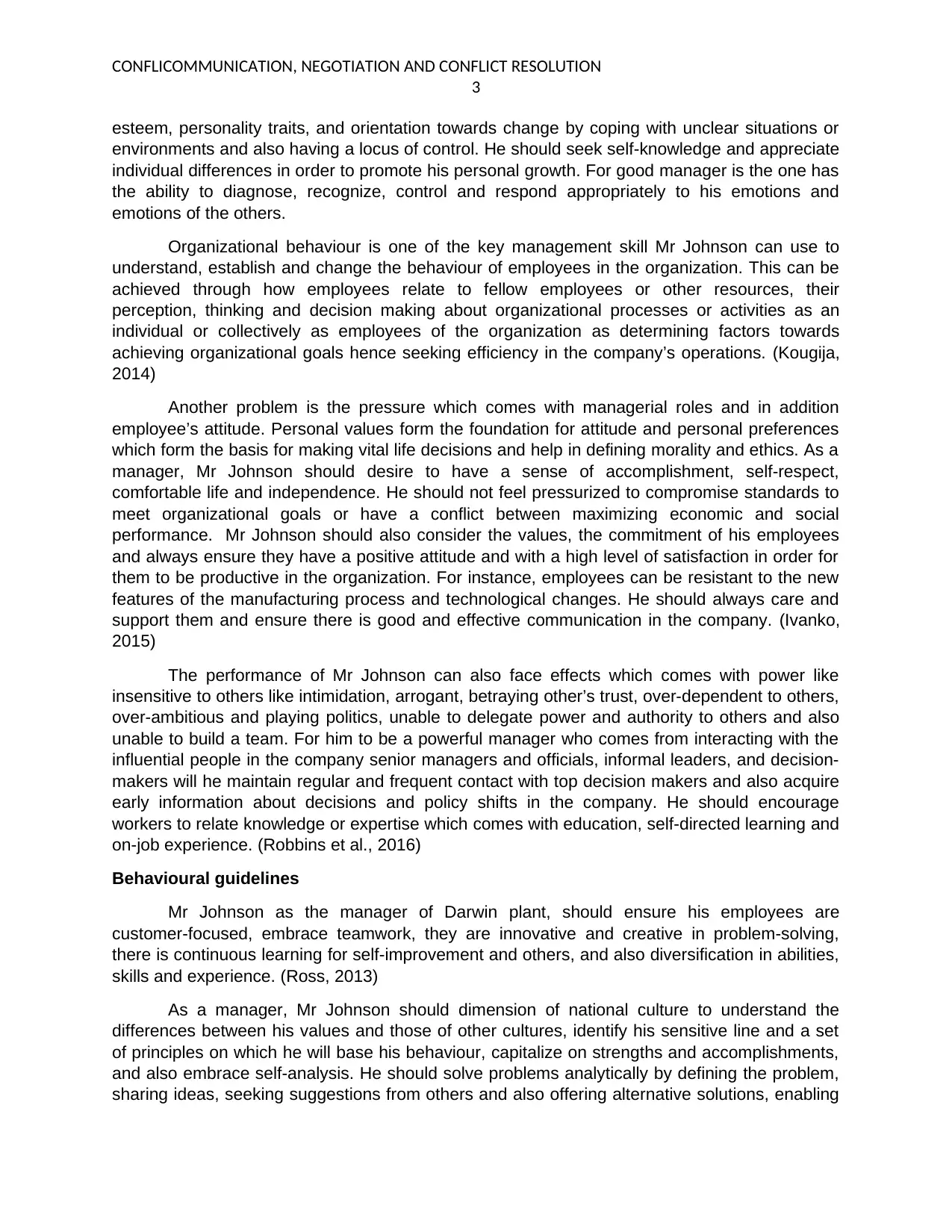
CONFLICOMMUNICATION, NEGOTIATION AND CONFLICT RESOLUTION
3
esteem, personality traits, and orientation towards change by coping with unclear situations or
environments and also having a locus of control. He should seek self-knowledge and appreciate
individual differences in order to promote his personal growth. For good manager is the one has
the ability to diagnose, recognize, control and respond appropriately to his emotions and
emotions of the others.
Organizational behaviour is one of the key management skill Mr Johnson can use to
understand, establish and change the behaviour of employees in the organization. This can be
achieved through how employees relate to fellow employees or other resources, their
perception, thinking and decision making about organizational processes or activities as an
individual or collectively as employees of the organization as determining factors towards
achieving organizational goals hence seeking efficiency in the company’s operations. (Kougija,
2014)
Another problem is the pressure which comes with managerial roles and in addition
employee’s attitude. Personal values form the foundation for attitude and personal preferences
which form the basis for making vital life decisions and help in defining morality and ethics. As a
manager, Mr Johnson should desire to have a sense of accomplishment, self-respect,
comfortable life and independence. He should not feel pressurized to compromise standards to
meet organizational goals or have a conflict between maximizing economic and social
performance. Mr Johnson should also consider the values, the commitment of his employees
and always ensure they have a positive attitude and with a high level of satisfaction in order for
them to be productive in the organization. For instance, employees can be resistant to the new
features of the manufacturing process and technological changes. He should always care and
support them and ensure there is good and effective communication in the company. (Ivanko,
2015)
The performance of Mr Johnson can also face effects which comes with power like
insensitive to others like intimidation, arrogant, betraying other’s trust, over-dependent to others,
over-ambitious and playing politics, unable to delegate power and authority to others and also
unable to build a team. For him to be a powerful manager who comes from interacting with the
influential people in the company senior managers and officials, informal leaders, and decision-
makers will he maintain regular and frequent contact with top decision makers and also acquire
early information about decisions and policy shifts in the company. He should encourage
workers to relate knowledge or expertise which comes with education, self-directed learning and
on-job experience. (Robbins et al., 2016)
Behavioural guidelines
Mr Johnson as the manager of Darwin plant, should ensure his employees are
customer-focused, embrace teamwork, they are innovative and creative in problem-solving,
there is continuous learning for self-improvement and others, and also diversification in abilities,
skills and experience. (Ross, 2013)
As a manager, Mr Johnson should dimension of national culture to understand the
differences between his values and those of other cultures, identify his sensitive line and a set
of principles on which he will base his behaviour, capitalize on strengths and accomplishments,
and also embrace self-analysis. He should solve problems analytically by defining the problem,
sharing ideas, seeking suggestions from others and also offering alternative solutions, enabling
3
esteem, personality traits, and orientation towards change by coping with unclear situations or
environments and also having a locus of control. He should seek self-knowledge and appreciate
individual differences in order to promote his personal growth. For good manager is the one has
the ability to diagnose, recognize, control and respond appropriately to his emotions and
emotions of the others.
Organizational behaviour is one of the key management skill Mr Johnson can use to
understand, establish and change the behaviour of employees in the organization. This can be
achieved through how employees relate to fellow employees or other resources, their
perception, thinking and decision making about organizational processes or activities as an
individual or collectively as employees of the organization as determining factors towards
achieving organizational goals hence seeking efficiency in the company’s operations. (Kougija,
2014)
Another problem is the pressure which comes with managerial roles and in addition
employee’s attitude. Personal values form the foundation for attitude and personal preferences
which form the basis for making vital life decisions and help in defining morality and ethics. As a
manager, Mr Johnson should desire to have a sense of accomplishment, self-respect,
comfortable life and independence. He should not feel pressurized to compromise standards to
meet organizational goals or have a conflict between maximizing economic and social
performance. Mr Johnson should also consider the values, the commitment of his employees
and always ensure they have a positive attitude and with a high level of satisfaction in order for
them to be productive in the organization. For instance, employees can be resistant to the new
features of the manufacturing process and technological changes. He should always care and
support them and ensure there is good and effective communication in the company. (Ivanko,
2015)
The performance of Mr Johnson can also face effects which comes with power like
insensitive to others like intimidation, arrogant, betraying other’s trust, over-dependent to others,
over-ambitious and playing politics, unable to delegate power and authority to others and also
unable to build a team. For him to be a powerful manager who comes from interacting with the
influential people in the company senior managers and officials, informal leaders, and decision-
makers will he maintain regular and frequent contact with top decision makers and also acquire
early information about decisions and policy shifts in the company. He should encourage
workers to relate knowledge or expertise which comes with education, self-directed learning and
on-job experience. (Robbins et al., 2016)
Behavioural guidelines
Mr Johnson as the manager of Darwin plant, should ensure his employees are
customer-focused, embrace teamwork, they are innovative and creative in problem-solving,
there is continuous learning for self-improvement and others, and also diversification in abilities,
skills and experience. (Ross, 2013)
As a manager, Mr Johnson should dimension of national culture to understand the
differences between his values and those of other cultures, identify his sensitive line and a set
of principles on which he will base his behaviour, capitalize on strengths and accomplishments,
and also embrace self-analysis. He should solve problems analytically by defining the problem,
sharing ideas, seeking suggestions from others and also offering alternative solutions, enabling
⊘ This is a preview!⊘
Do you want full access?
Subscribe today to unlock all pages.

Trusted by 1+ million students worldwide
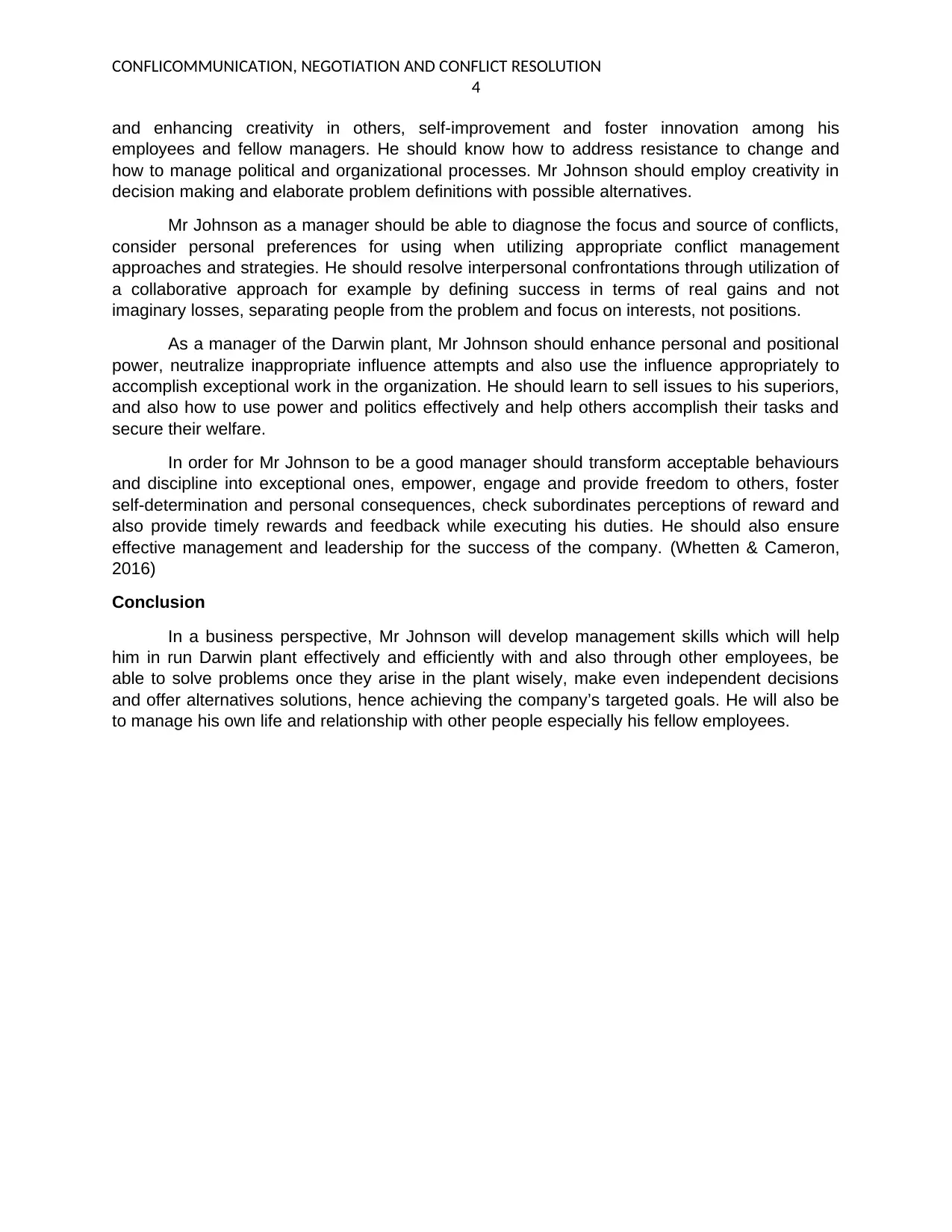
CONFLICOMMUNICATION, NEGOTIATION AND CONFLICT RESOLUTION
4
and enhancing creativity in others, self-improvement and foster innovation among his
employees and fellow managers. He should know how to address resistance to change and
how to manage political and organizational processes. Mr Johnson should employ creativity in
decision making and elaborate problem definitions with possible alternatives.
Mr Johnson as a manager should be able to diagnose the focus and source of conflicts,
consider personal preferences for using when utilizing appropriate conflict management
approaches and strategies. He should resolve interpersonal confrontations through utilization of
a collaborative approach for example by defining success in terms of real gains and not
imaginary losses, separating people from the problem and focus on interests, not positions.
As a manager of the Darwin plant, Mr Johnson should enhance personal and positional
power, neutralize inappropriate influence attempts and also use the influence appropriately to
accomplish exceptional work in the organization. He should learn to sell issues to his superiors,
and also how to use power and politics effectively and help others accomplish their tasks and
secure their welfare.
In order for Mr Johnson to be a good manager should transform acceptable behaviours
and discipline into exceptional ones, empower, engage and provide freedom to others, foster
self-determination and personal consequences, check subordinates perceptions of reward and
also provide timely rewards and feedback while executing his duties. He should also ensure
effective management and leadership for the success of the company. (Whetten & Cameron,
2016)
Conclusion
In a business perspective, Mr Johnson will develop management skills which will help
him in run Darwin plant effectively and efficiently with and also through other employees, be
able to solve problems once they arise in the plant wisely, make even independent decisions
and offer alternatives solutions, hence achieving the company’s targeted goals. He will also be
to manage his own life and relationship with other people especially his fellow employees.
4
and enhancing creativity in others, self-improvement and foster innovation among his
employees and fellow managers. He should know how to address resistance to change and
how to manage political and organizational processes. Mr Johnson should employ creativity in
decision making and elaborate problem definitions with possible alternatives.
Mr Johnson as a manager should be able to diagnose the focus and source of conflicts,
consider personal preferences for using when utilizing appropriate conflict management
approaches and strategies. He should resolve interpersonal confrontations through utilization of
a collaborative approach for example by defining success in terms of real gains and not
imaginary losses, separating people from the problem and focus on interests, not positions.
As a manager of the Darwin plant, Mr Johnson should enhance personal and positional
power, neutralize inappropriate influence attempts and also use the influence appropriately to
accomplish exceptional work in the organization. He should learn to sell issues to his superiors,
and also how to use power and politics effectively and help others accomplish their tasks and
secure their welfare.
In order for Mr Johnson to be a good manager should transform acceptable behaviours
and discipline into exceptional ones, empower, engage and provide freedom to others, foster
self-determination and personal consequences, check subordinates perceptions of reward and
also provide timely rewards and feedback while executing his duties. He should also ensure
effective management and leadership for the success of the company. (Whetten & Cameron,
2016)
Conclusion
In a business perspective, Mr Johnson will develop management skills which will help
him in run Darwin plant effectively and efficiently with and also through other employees, be
able to solve problems once they arise in the plant wisely, make even independent decisions
and offer alternatives solutions, hence achieving the company’s targeted goals. He will also be
to manage his own life and relationship with other people especially his fellow employees.
Paraphrase This Document
Need a fresh take? Get an instant paraphrase of this document with our AI Paraphraser
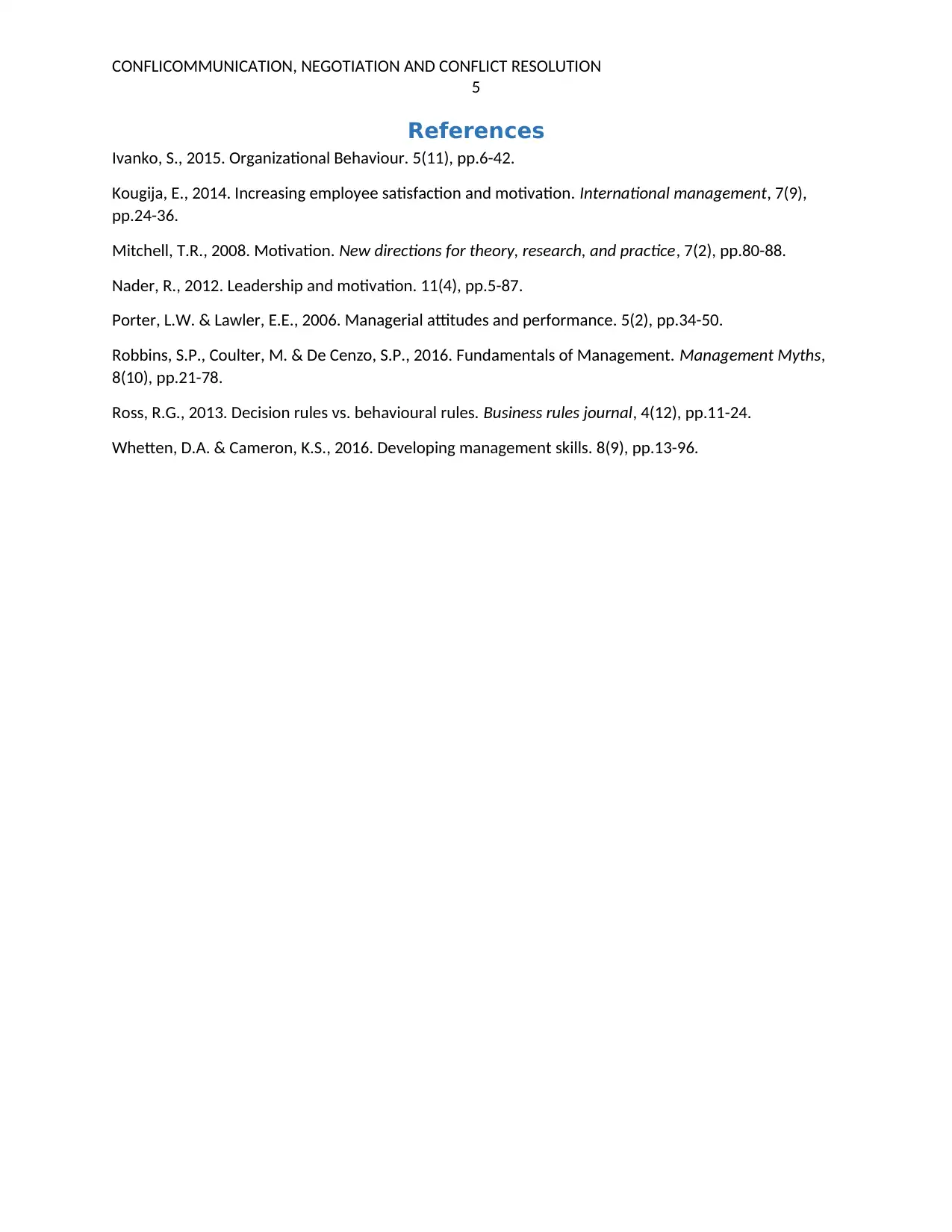
CONFLICOMMUNICATION, NEGOTIATION AND CONFLICT RESOLUTION
5
References
Ivanko, S., 2015. Organizational Behaviour. 5(11), pp.6-42.
Kougija, E., 2014. Increasing employee satisfaction and motivation. International management, 7(9),
pp.24-36.
Mitchell, T.R., 2008. Motivation. New directions for theory, research, and practice, 7(2), pp.80-88.
Nader, R., 2012. Leadership and motivation. 11(4), pp.5-87.
Porter, L.W. & Lawler, E.E., 2006. Managerial attitudes and performance. 5(2), pp.34-50.
Robbins, S.P., Coulter, M. & De Cenzo, S.P., 2016. Fundamentals of Management. Management Myths,
8(10), pp.21-78.
Ross, R.G., 2013. Decision rules vs. behavioural rules. Business rules journal, 4(12), pp.11-24.
Whetten, D.A. & Cameron, K.S., 2016. Developing management skills. 8(9), pp.13-96.
5
References
Ivanko, S., 2015. Organizational Behaviour. 5(11), pp.6-42.
Kougija, E., 2014. Increasing employee satisfaction and motivation. International management, 7(9),
pp.24-36.
Mitchell, T.R., 2008. Motivation. New directions for theory, research, and practice, 7(2), pp.80-88.
Nader, R., 2012. Leadership and motivation. 11(4), pp.5-87.
Porter, L.W. & Lawler, E.E., 2006. Managerial attitudes and performance. 5(2), pp.34-50.
Robbins, S.P., Coulter, M. & De Cenzo, S.P., 2016. Fundamentals of Management. Management Myths,
8(10), pp.21-78.
Ross, R.G., 2013. Decision rules vs. behavioural rules. Business rules journal, 4(12), pp.11-24.
Whetten, D.A. & Cameron, K.S., 2016. Developing management skills. 8(9), pp.13-96.
1 out of 5
Related Documents
Your All-in-One AI-Powered Toolkit for Academic Success.
+13062052269
info@desklib.com
Available 24*7 on WhatsApp / Email
![[object Object]](/_next/static/media/star-bottom.7253800d.svg)
Unlock your academic potential
Copyright © 2020–2026 A2Z Services. All Rights Reserved. Developed and managed by ZUCOL.





